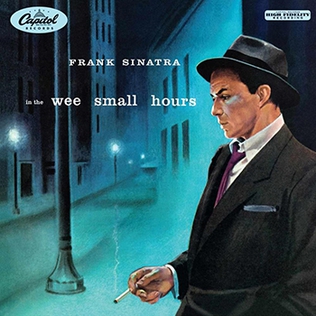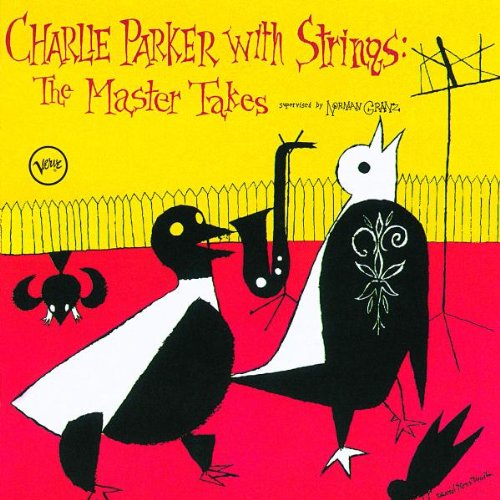Recent listening, current
Archived listening, 2013-2016
Showing posts with label orchestra. Show all posts
Showing posts with label orchestra. Show all posts
Monday, June 22, 2015
206. Frank Sinatra / In the Wee Small Hours (1955)
Though not as languished as 1959's No One Cares, this album of ballads sets the bar for melancholy, as well as being the first of the themed (and innovative) full-length LP's that Sinatra recorded for Capitol. Gordon Jenkins arranged and conducted on No One, but originally it was Nelson Riddle at the stand. The collaboration is magical. Riddle's restrained treatments underscore the mood of each lyric and magnify their impact. Sinatra expertly uses breath control and different vocal textures to interpret the material while Riddle's charts employ orchestral color at all the right incidental moments. Sinatra sings the passages carefully, sounding deeper and more mature than ever before. The frankness of songs like "Last Night When We Were Young," "I See Your Face Before Me," and "When Your Lover Has Gone" have secured In the Wee Small Hours a permanent place in the hearts of many fans. It remains one of his most satisfying and moving performances on wax. More than a routine set of ballads, it only takes a few notes to know that Sinatra is making these songs his own. At the same time, they're yours too.
Tuesday, October 22, 2013
144. Yma Sumac / Voice of the Xtabay (1950)
Xtabay is the Peruvian soprano's famous American debut. Its release was in 1950 when she signed to Capitol and began thrilling audiences with an astonishing range of nearly five octaves. The songs were composed and arranged by Les Baxter along with husband Moises Vivanco, and John Rose. Exotica aficionados will appreciate the presence of Baxter but Vivanco actually gets most of the credits. Some of these tracks, or at least snippets of them, have appeared in advertising campaigns and movie soundtracks, so there could be many listeners who are familiar with the voice but unaware of who it is. Selections combine catchy snatches and "exotic" percussion with lush jazz instrumentation and strains of Peruvian folk music. Some songs are haunting and ethereal ("Virgin of the Sun God"), some are delightfully quirky ("Monos"), and all feature Sumac's captivating voice. She doesn't just sing, either, but breathes, chants, yelps, croons, and shouts. It's invigorating! If you're new to this vocalist, then you could get one of those greatest hits compilations, but you'd do just as well to start here, and it's a very nice item for the shelf.
Labels:
1950,
capitol,
debut,
exotica,
john rose,
latin,
les baxter,
lounge,
moises vivanco,
orchestra,
peru,
vocal,
vocalist,
xtabay,
yma sumac
Thursday, October 3, 2013
142. Miles Davis / Miles Ahead (1957)
This album is the natural progression out of the Miles Davis Nonet style that was documented on The Complete Birth of the Cool. Davis and Evans deliver on the promise with a new band almost double in size. Davis is the only soloist, playing flugelhorn instead of trumpet. Evans is composer and arranger. The sound of the orchestra is lush and slick, clear evidence of the project's bigger budget. Evans' arrangements elegantly capitalize on the power of the massed pieces, and with Davis on the flugelhorn, there's a stately majesty at play. The playlist is arranged like one continuous performance (see Such Sweet Thunder by Duke Ellington). I love the way all the moods melt into one another, contrasting against a greater arc of musical story. The Spanish tinge of "Maids of Cadiz," for example, or the hard swinging "New Rhumba" (Ahmad Jamal) that explodes from "Blues for Pablo." It's magic, and essential listening for all jazz fans. No excuses!
Wednesday, September 4, 2013
130. Charlie Parker / Charlie Parker with Strings: The Master Takes (1995)
If you're only interested in Bird's famous recordings with a small orchestra, then you can save a little coin with this attractive disc. (It's only fair to say that for just a few extra bucks, $20 on average for used, you can have all the material here plus much more and better liner notes if you buy the Complete Verve Masters.) But as this disc's title indicates, it contains the complete master takes of Bird's famous 1950 sessions with strings. In addition to the 14 tracks contained on the original two LPs by Mercury, the Verve CD contains 10 bonus tracks recorded 1947-1952. The orchestral numbers are all standards, and when they work, it's magic. Some have argued that this was a commercial sell out. It was so successful that it led to a flood of other artists playing with strings. The truth is that Parker himself always wanted to play with an orchestra, and these recordings fulfilled his dream. In the greater context of jazz today, I think it's a stale argument and intentions don't matter. Who cares whose idea it was? Hey, it's Bird, there's some extra musicians, and the result is warm, elegant, and hard to turn off. Whoever can't enjoy such an engagement must be difficult to please. Likewise are my feelings for Cliff Brown, Dizzy, or anybody else who went in the studio with an orchestra in the 1950s.
Labels:
1947,
1948,
1949,
1950,
1951,
1952,
bebop,
bop,
charlie parker,
charlie parker with strings the complete master takes,
mercury,
orchestra,
review,
tenor sax,
tenor saxophone,
verve
Friday, April 5, 2013
72. Frank Sinatra / No One Cares (1959)
This collection of lovelorn standards is about as dark as Sinatra gets. The selections, with orchestra, were arranged and conducted by Gordon Jenkins. They collaborated on several other albums for Capitol, and oddly enough this is my favorite. Sinatra supposedly referred to this as a set of suicide songs, although I haven't verified that. One might listen and think some levity is in order, but is it really? While the material and arrangements are stormy (the photo on the jacket ain't no joke), the mood is a nice change of pace and Sinatra's mature performance is rich and captivating. He sings confidently and in good voice, working through the likes of "I Don't Stand a Ghost of a Chance," "I Can't Get Started," and the superb "Stormy Weather," and a handful of others big and small. I think some of these performances might be worthy of their own benchmarks, even as high as the bar was set by other performers in earlier times. Enjoy the CD which contains several previously unreleased bonus tracks.
Monday, February 18, 2013
38. Miles Davis / Ballads (1990)
Talk about the quintessential nonessential Miles Davis CD, this is it. Columbia compiled a scanty eight tracks recorded between 1961 and '63, and released them here with a ballads-only theme. Very little about Miles Davis in the sixties sounds dated or anachronistic to my ears, but in today's climate of iPods and customized playlists, such a compilation album doesn't have the same role it did in 1990. And this product, as a whole, hasn't aged well even if the opposite is true for the selections themselves. I say it didn't age well but I'm not sure it would have made sense 20 years ago, either. First, it's an odd choice of material if you're trying to showcase what Davis could do with a ballad. Five tracks by the Gil Evans orchestra, two by the quintet with George Coleman and a live cut by the Mobley quintet is a rather baffling sequence. Are we doing Evans, or a club date? Because the two are so unlike each other that the program seems interrupted when the group changes. The very context of the Gil Evans orchestra was so different than that of a street group, any street group, that a ballad within its fold is a thing transmuted, a wholly different musical animal. Good work from everyone involved musically, but shame on Columbia for ever selling this.
Labels:
1961,
1962,
1963,
1990,
ballad,
ballads,
columbia,
compilation,
cornet,
george coleman,
gil evans,
hank mobley,
jazz,
miles davis,
orchestra,
quintet,
trumpet
Subscribe to:
Posts (Atom)





